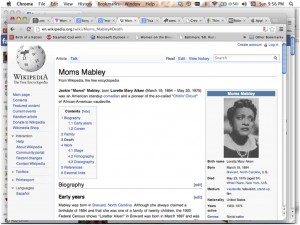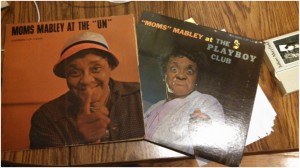Moms at the myth (Part 2)
06 November 2014 – Mary Rizzo

The Wikipedia entry that started the authors’ search, captured on February 17, 2013. Screenshot by the authors.
Continued from Part 1
Our suspicions about the too-great-to-be-true Moms at the “Mich” album cover led us back to the Wikipedia entry that had started our quest for details about this little-known moment in LGBT (Lesbian, Gay, Bisexual, and Transgender) history. When we looked at the edit logs, however, we saw that that important bit of historical information had been added quite recently. In August 2010, someone edited the entry to include the festival as well as the tidbit that Moms was one of the first XXX-rated comedians on the circuit, with a footnote that led to–you guessed it–Queers in History. Who made this addition? Did he or she have a secret archive of documents in the attic? We tried reaching out to the person who edited the Wikipedia entry, but the email address was dead.
We paused to take stock. Was there any verifiable source outside of this closed loop? No. But where did Moms at the “Mich” come from, this tantalizing bit of seemingly material culture? The top Google hit for it leads to Rate Your Music, a reputable music-geek site, where it was added by a moderator who’s clearly no troll. But follow the “buy this album” links, and you’re in what neologism-happy Internet theorists used to call Cyberia. There’s nothing on Amazon or Ebay or any filesharing music blogs either.

Two of Moms’ many comedy albums. Take a close look at “Moms Mabley at the UN!” Photo by Whitney Strub
At this point our eagerness gave way to closer scrutiny of the evidence. Why did the album title look so much like Comic Sans font? Did somebody Photoshop that cover, which looks absolutely nothing like the X-rated comedy albums of the ’70s? Plus, waaaaaaaaait, why does Moms Mabley look exactly the same as that cover art from Moms Mabley at the “UN”? And not to be too nitpicky, but didn’t the Michigan Womyn’s Music Festival begin in August 1976, over a year after Mabley’s death? Hmm.
We searched deeper within Google’s results and came across a message board which included quotes from tough broads about men, with Bette Davis and Moms Mabley as examples. Someone mentioned the album here, with a link to something called Dyxploitation, but alas: link rot!
With a tantalizing dead link as our new source, we mined the Internet Archive’s Wayback Machine to find that Dyxploitation had been a satirical online lesbian magazine at the dawn of the Snark Era in the 1990s. Its second issue had included an article–tongue-in-cheek, though not transparently so–about Moms Mabley’s raunchy performance at the Michigan Womyn’s Festival. Describing how the festival’s organizers were “anxious to add more women of color to the line-up,” they booked her unaware that she would show up with “a deluxe camper filled with scantily clad women.” Her supposed jokes included gems that would have made Redd Foxx blush: “Did you know I was on President Nixon’s enemies list? Yes darlin’, I told Tricia that if the Pilgrims had shot bobcats instead of turkeys for food, we’d be eating pussy for Thanksgiving.”
According to Dyxploitation, the festivalgoers were horrified, unable to handle such explicit sexuality, especially from an old woman.
Except none of it was true. Dyxploitation’s editor, a freelance writer who now writes about lesbian relationships for Match.com, created the whole story as an in-joke, one that riffed on white lesbians’ desire to have women of color involved in their world and on the stereotypical humorlessness of uptight white lesbians. Perhaps she knew that her story, a few paragraphs and a Photoshopped fake album cover had spawned a rewriting of one mostly forgotten woman’s life. Or maybe she had no idea that her joke lived on.
The whole thing was at least plausible–in fact, it was only after scratching our heads over an anachronistic Anita Bryant joke (she began her crusade against gay visibility and equality in 1977, so even though she had already campaigned for broader conservative causes like “decency” by 1975, the purported joke wouldn’t really have been legible yet) that we knew it was a fake.
In the process of digging around, listening to her records, and thinking about Internet knowledge-production, we came to fall in love with Moms. So as a final tribute to her (and as a gesture of solidarity with the Feminist Edit-a-thon), we went in and cut the offending misinformation.
In a world in which creating and unraveling Internet hoaxes is deemed educational, should we be embarrassed at how easily duped we were? Or was our ability to unravel the joke (and, indeed, much like the recent admission of a fabricated Wikipedia detail about the origins of fictional character Amelia Bedelia, this does not seem to be a hoax since it was never meant to maliciously fool anyone) a sign that we were expert decoders, 21st-century historians extraordinaire? Or perhaps we were reflections of an age of sped-up academic production? So eager were we to find an unused source and to have a unique argument that we nearly had written the journal article in our heads before we checked our facts.
In this regard, of course, the Internet is both boon and bane. While we had initially been led astray by Wikipedia, our subsequent trawling through dead, archived links with a critical eye ultimately produced more accurate and nuanced knowledge. Even though Moms Mabley never played the “Mich” with a bevy of nubile ladies, her importance to lesbian feminist history is still worthy of more scholarly attention.
~ Mary Rizzo is co-editor of The Public Historian and Public Historian in Residence at the Mid-Atlantic Regional Center for the Humanities at Rutgers University-Camden
~ Whitney Strub is associate professor of history and director of Women’s and Gender Studies at Rutgers University, Newark




1 comment